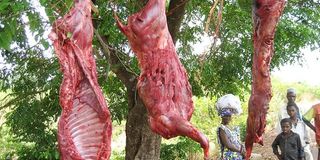East Africa sees rise in poaching for bushmeat

What you need to know:
Partly due to fear of the Covid-19 pandemic, the rise in urban-to-rural migration in the region pushed up demand for bushmeat - leading to increased poaching of wildlife
Dar esSalaam. Wildlife conservationists are worried about the rise of poaching incidents for bushmeat in the East African Community (EAC) region.
They argue that, as long as poaching endangers such species as elephants, the illegal hunting of such animals as giraffe, antelope and dik-dik for bushmeat is yet another threat to wildlife.
They say that, due to fear of the Covid-19 pandemic, there has been increased urban to rural migration in countries like Rwanda, Uganda, South Sudan and Kenya. This has fueled demand for bushmeat. Kenya Wildlife Service (KWS) director general John Waweru said from January to March alone this year, 2.8 tonnes of bushmeat were confiscated.
“Last year during the same period, only 1.8 tonnes of bush-meat were seized at the Numbu market in Nairobi. So, there is an increase of 51 per cent within a short period,” he said.
He made the remarks yesterday during an online meeting on the impact of Covid-19 on wildlife conservation in the region - and plausible recovery measures for the region’s tourism and wildlife sectors.
Mr Waweru added that to over-come the challenge the government will in the next few weeks allocated Ksh1 billion to recruit 160 game officers and train them on wildlife protection, whereas some Ksh2 billion would be allocated for the development and enhancement of community conservation areas.
The Uganda Wildlife Authority (UWA) executive director Samuel Mhandha said they recently arrested several culprits in connection with poaching.
Mr Mhandha stressed that although the issue of handling wildlife crime is very complex due to the pandemic a number of suspects have been arrested and taken to court: “We are targeting the bushmeat market to avoid poaching”.
April this year, Tanzania’s National Task Force Anti-Poaching chairman Robert Mande said they had already dispatched monitoring teams to known hotspots around the country to investigate a spate of reports of poaching for bushmeat.
But he said he was skeptical that the organised smuggling rings behind the almost industrial-scale slaughter of the early 2010s would reappear. Tanzania lost 60 percent of its elephants between 2009 and 2014.
“Ivory traffickers are organised in such a way you need to have all four or five levels of the network participating. Because we dismantled all the networks, I doubt they will be able to reorganise quickly.
Especially given the travel restrictions,” he said. “But bushmeat is consumed locally, and that is a different business.
Eastern and Southern Africa, International Union for Conservation of Nature (IUCN) director Luther Anukur said the impact of Covid-19 is going to have long-term impacts on wildlife and tour-ism sector therefore EAC should switch to other potential sectors to save their economies.




